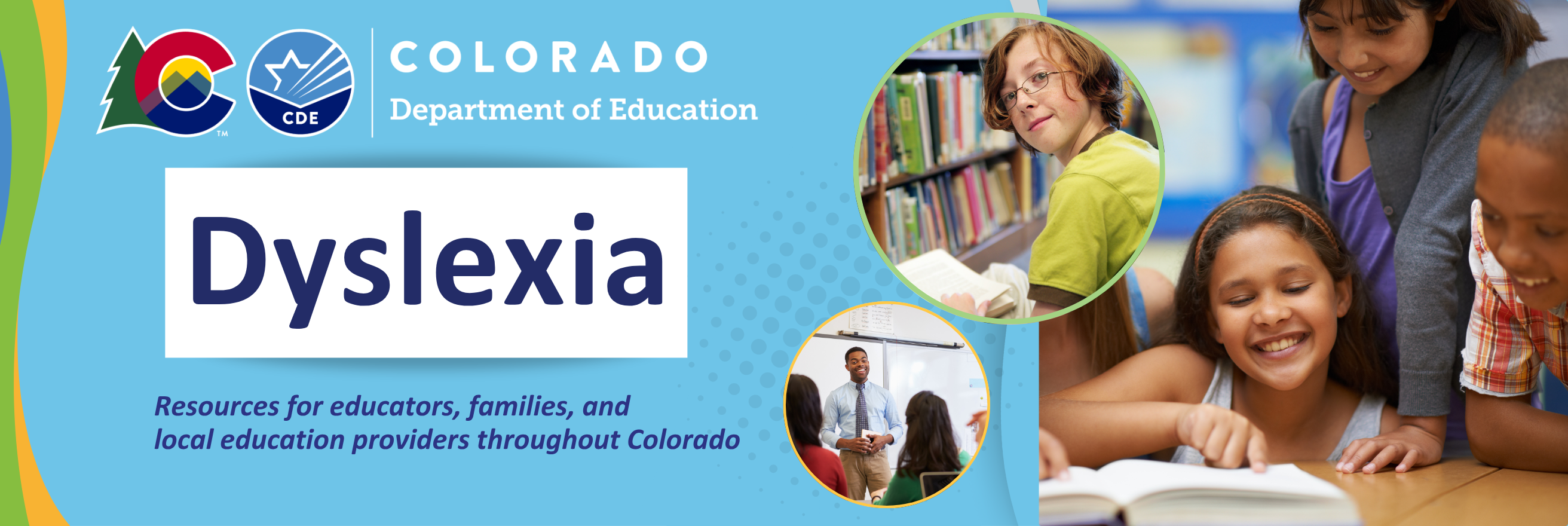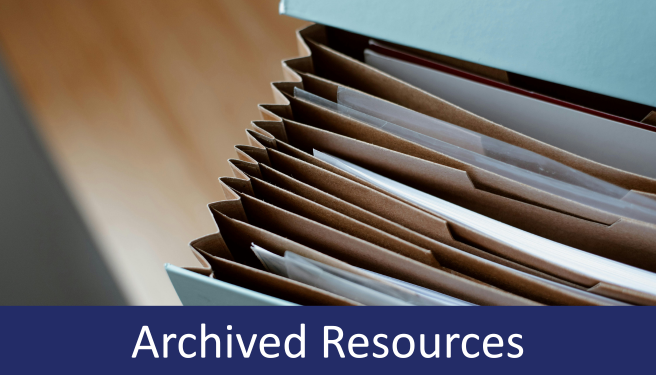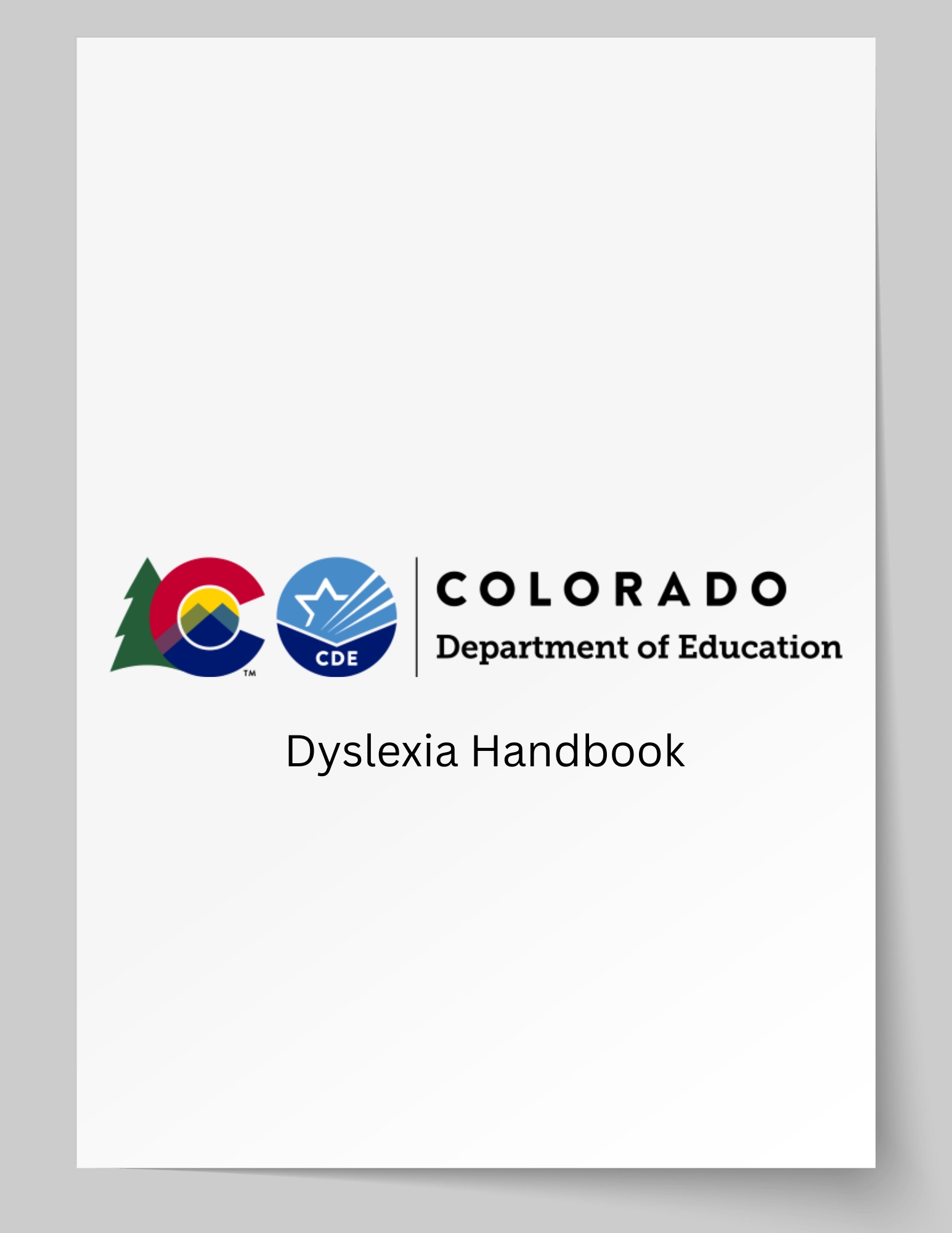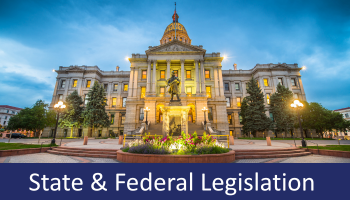You are here
Colorado Dyslexia

Colorado Department of Education and Dyslexia
What is dyslexia?
In May 2025, Senate Bill 25-200 defined dyslexia, closely aligning Colorado's definition with the widely accepted definition adopted by The International Dyslexia Association (IDA), along with the National Institute of Child Health and Human Development (NICHD):
Dyslexia means a specific learning disability that is neurobiological in origin and characterized by difficulties with accurate or fluent word recognition and by poor spelling and word-decoding abilities. These difficulties typically result from a deficit in the phonological component of language that is often unexpected in relation to other cognitive abilities and the provision of effective classroom instruction. Secondary consequences of dyslexia may include problems in reading comprehension and reduced reading experience that can impede growth of vocabulary and background knowledge. §22-7-1203 (3.5), C.R.S.
CDE is committed to:
- Supporting educators with best first instruction and practices in meeting the needs of students who struggle with reading, including those with dyslexia or with characteristics of dyslexia.
- Assisting local education providers in developing structures that optimize outcomes for students who struggle with reading, including those with dyslexia or with characteristics of dyslexia.
- Providing resources for students and their families about reading difficulties, including dyslexia.
- Building upon the Colorado Reading To Ensure Academic Development Act (READ Act), to ensure all children meet important reading milestones by third grade.
The impact of dyslexia on students can vary widely. Students who have characteristics of dyslexia or reading difficulties may struggle in different areas of literacy, as well as in other content areas. Fortunately, decades of research provide a roadmap for educators on how to teach reading to students who share these difficulties. High quality, scientific and evidence-based instruction, often referred to as the Science of Reading, can help mitigate the impact of reading difficulties and dyslexia. In Colorado, accurate screening for Kindergarten through third grade students provides a first alert for reading difficulties, including characteristics of dyslexia, and is used with a body of evidence to guide instructional decision making and interventions for students.

- Margie Gillis, Ed.D CDE Collaboration (2018 CDE Dyslexia Forum Presentation)
- Jack Fletcher, Ph.D CDE Collaboration (2017 CDE Dyslexia Forum Presentation)
- Archived DWG Meeting Information
- CDE Dyslexia Pilot Information
Screening for Characteristics of Dyslexia
Overview
Senate Bill 25-200 expands upon the Colorado Reading to Ensure Academic Development Act (READ Act) by including screening requirements for characteristics of dyslexia, additional measures that may be included in the body of evidence used to determine if a child has a significant reading deficiency (SRD), and required talking points relating to dyslexia in parent communication.
Timeline
Full implementation of SB 25-200 is expected at the beginning of the 2027-28 School Year. Leading up to the date of implementation, several phases of work will take place.

School Identification vs. Clinical Diagnosis of Dyslexia
There is frequent confusion regarding the difference between the clinical diagnosis of dyslexia and the school based identification of dyslexia as a specific learning disability. The diagnostic term “dyslexia” can be used by clinicians working in a private clinical setting and by evaluation teams found within a public school setting. The use of dyslexia as a descriptor of a specific type of reading disorder (and a specific type of learning disability) is not limited to those working in a medical setting. Rather, its use is only limited by the training and assessment experience of those who would use the term.
In Colorado, there is no statute or regulation that would prohibit the use of the word dyslexia in a school setting or within school-generated documents. Likewise, there are no federal rules that prohibit the use of the term “dyslexia” when identifying a phonological-based, word-level reading disorder in a school-based setting. In using the descriptor “dyslexia,” the person or persons using the term have a responsibility to thoroughly understand: typical reading development; what dyslexia is and is not; the key features of dyslexia; how it is assessed; and their obligation to use valid and reliable measurement tools and sound diagnostic judgment when making such a diagnosis.
Understood (Understood.org), a consortium of 15 nonprofit organizations that joined forces to support parents of children with learning and attention issues, offers an easy-to-read comparison of a school diagnosis and a clinical diagnosis as commonly recognized in current practice. In both instances, the purpose of the evaluation is the identification of the student’s specific profile leading to the implementation of an appropriate remediation plan.
Since dyslexia is not one of the educational disability categories specified in federal or state law, a student with dyslexia is most likely to be identified with a specific learning disability if they meet eligibility requirements for special education services. (See Section 8.3 Federal Legislation for more information on determination of eligibility.)
Dyslexia Working Group
NEWS
Applications are now being accepted for two available positions on the Dyslexia Working Group. The working group was established in the 2019 legislative session by the Colorado General Assembly through House Bill 19-1134. The legislation directs the Commissioner of Education to convene a Dyslexia Working Group to improve the identification of and educational support for students with dyslexia to improve their educational outcomes.
The following positions are currently available for the 2025-2026 school year starting in the fall:
- A parent of a child identified with dyslexia and a disability.
- A state or national dyslexia expert
If interested, application submissions can be completed by following this link. The application window will remain open until Friday, October 31, 2025.
Questions about the application process can be sent to Joanna Bruno at Bruno_J@cde.state.co.us.
During the 2019 legislative session, the Colorado General Assembly passed House Bill 19-1134 (PDF), Identification and Interventions for Students with Dyslexia. The bill created a working group appointed by the Commissioner of Education to analyze state and national data and practices concerning identification and support of students with dyslexia. The working group is also tasked with recommending dyslexia screening tools and processes, a statewide plan for identifying and supporting students with dyslexia, and educator training in recognizing and providing interventions for students with dyslexia. The working group must annually submit a report of its recommendations to the Commissioner, and the Commissioner must submit the report to the State Board of Education and the education committees of the General Assembly.
The bill also establishes a pilot program to assist local education providers in using READ Act assessments to screen for dyslexia and in providing interventions for students who are identified as having dyslexia. More information about the pilot program will be available in the late fall of 2020.
For questions regarding the Dyslexia Working Group, please contact Joanna Bruno, Ph.D. at Bruno_J@cde.state.co.us
2025/26 Dyslexia Working Group Meetings
Dyslexia Working Group meetings are open to the public; however, only working group members have an active role in the meetings.
- Friday, September 12, 2025; 9am - 3pm
- In Person Meeting
- Location: Colorado Department of Education, 1525 Sherman, 2nd Floor, Denver, CO 80203
- Red Rocks Conference Room
- Location: Colorado Department of Education, 1525 Sherman, 2nd Floor, Denver, CO 80203
- Meeting Agenda (PDF) | Meeting Summary (PDF)
- CDE Review and Updates (PDF)
- Multilingual Learners and Reading Assessment Presentation (PDF)
- English Learners and Dyslexia (PDF)
- Dyslexia Handbook (PDF)
- In Person Meeting
- Friday, November 14, 2025; 9am-11am
- Virtual Meeting
- Meeting Agenda (PDF) | Meeting Summary (PDF)
- Friday, January 23, 2026; 9am - 3pm
- In Person Meeting
- Location: Colorado Department of Education, 1525 Sherman, 2nd Floor, Denver, CO 80203
- Red Rocks Conference Room
- Location: Colorado Department of Education, 1525 Sherman, 2nd Floor, Denver, CO 80203
- Meeting Agenda (PDF) | Meeting Summary (PDF)
- In Person Meeting
- Friday, March 13, 2026; 9am - 11am
- Virtual Meeting
- Meeting Agenda (PDF) | Meeting Summary (PDF)
Dyslexia Working Group Reports
The outcomes for each year of the Dyslexia Working Group are outlined in an annual report. The annual reports for the following years are available to download:
Dyslexia Working Group Membership
HB 19-1134 specifies that the membership of the Dyslexia Working Group consist of the following:
- A parent of a child who is identified as having dyslexia
- A parent of a child who is identified as having dyslexia and a disability
- A school district literacy specialist
- A school district director of special education
- A state or national literacy expert
- A state or national dyslexia expert
- Two elementary grade teachers, one of whom teaches in a rural school district or a small rural school district
- A principal who is employed at an elementary school in a rural school district or an employee of a board of cooperative services who has expertise as a literacy specialist
- A faculty member of an institution of higher education who teaches in an approved educator preparation program for elementary grade teachers
- A member of the local chapter of an international dyslexia association
Dyslexia Working Group Members
Marcela Eichmann
April Gerakos-Rooker
Sarah Huffman
Jennifer Imel
Cindy Kanuch
Patrick McGinty
Sissy Peters
Brian Rose, Ph.D.
Janine Runfola
Laura Swanson
Dyslexia Pilot
Overview
The Colorado General Assembly created a dyslexia pilot program through House Bill 19-1134 during the 2019 legislative session. The purpose of the program is to pilot the use of READ Act assessment results and a research-based protocol to identify markers of dyslexia in K - 3 students. Further, pilot sites will receive training and coaching to provide support to young students who may demonstrate the early markers for dyslexia. Initially, the pilot program was expected to run for one year, however, was extended an additional year.
During the second year of the pilot program, four schools (Cohort Two) participated in the year-long program from June 2022 through June 2023. Through the pilot program, schools received no-cost training and support for kindergarten, first-, second-, and third-grade teachers in utilizing the pilot identification process for markers of dyslexia. All pilot program activities were communicated and delivered by the University of Oregon pilot program team, who were selected to lead the project.
All participating schools committed to program training in dyslexia and the use of the University of Oregon’s dyslexia screening protocol.
The training hours will be able to be used to meet up to 9 hours the new special education training requirements under House Bill 20-1128. The dyslexia pilot training requirements will not meet the teacher training requirements for the READ Act due to the specificity of those training requirements.
Status of the Pilot Program
The pilot program concluded at the end of the 2022-23 school year. CDE produced a report on the pilot program presented to the State Board of Education and legislature. Per statutory requirements, the report included information regarding the implementation and evaluation of the pilot program. For more information or archived resources from the Dyslexia Pilot please contact Joanna Bruno, Ph.D. by email Bruno_J@cde.state.co.us or by phone (303) 919-3907.








Connect With Us





